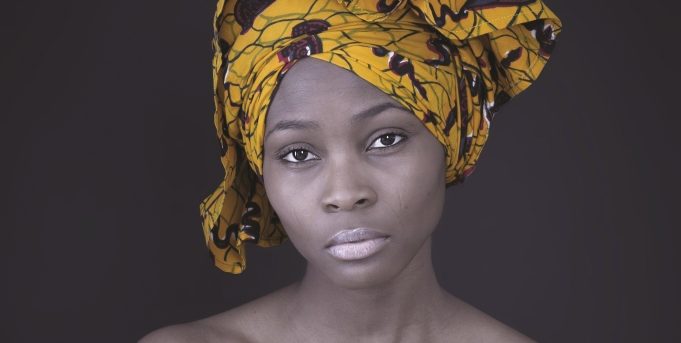Sixteen-year-old Yaema lives in Kenema, a major city in Sierra Leone, with her aunt who raised her after both her parents passed away when she was still a little child. Around six months ago, one of her uncles sexually assaulted her when he came home drunk. Her aunt dismissed the incident when Yaema told her about it the following day.
“I was warned by my aunty to think carefully about my future before making such an evil accusation,” says Yaema.
Along with the emotional trauma she had to endure after the rape, Yaema now also has a physical reminder of it; she is pregnant. Her aunt will not accept that her brother is guilty. She accuses Yaema of sneaking away from school to play “husband and wife” with her boyfriend.
There is no respite at school either. Yaema goes through a rigorous routine of strapping a bandage across her stomach and wearing oversized cardigans to hide her pregnancy. The strapping, with the help of her friend Hassanatou, takes about an hour each morning. Although the strapping could be detrimental to the health of Yaema and her baby, it is something she is willing to do so she can realize her dream of finishing school and becoming a lawyer one day.
“If my teachers find out I am pregnant I will not be allowed to sit my BECE exams this year because of the ban,” says Yaema.
Loading...
In April last year, the Sierra Leone government banned pregnant girls from attending school and sitting exams. The Basic Education Certificate of Examination (BECE) qualification is needed to attend senior secondary school.
Hassanatou and Yaema have been best friends since they met in primary six. This year they hope to pass their BECE exams and attend the Modern High School in the country’s capital Freetown.
“It is so unfair that Yaema might not get to graduate this year because of something she had no control over,” rues Hassanatou.
The ban sparked outrage from human rights organizations around the world.
“This is very disturbing for Amnesty International because this stigmatizes over 10,000 girls, destroying their future life chances,” says Sabrina Mahtani, West African Researcher for Amnesty International.
The ban comes at a time when children in Sierra Leone have already missed nine months of school due to the Ebola outbreak.
“This is a practice that predates Ebola and it was more of an informal practice in some schools, but now this informal private practice has been turned into a formal government policy,” says Mahtani.
According to Amnesty International, the Ebola crisis led to young girls becoming victims of sexual attacks and forced marriages. The National Strategy for the Reduction of Teenage Pregnancy, introduced by the government of Sierra Leone in 2013 and cited in the Amnesty International report, states that 28% of girls between the age of 15 and 19 are either mothers or pregnant.
“The Truth and Reconciliation Commission, which was set up after the war in 2004, said that the exclusion of pregnant girls from education is discriminatory and archaic and we think the ban of the pregnant girls is a missed opportunity to correct the previous wrong,” says Mahtani.
There are some who vehemently support the ban though. A teacher, who wishes to remain anonymous, says the classroom is no place for a pregnant girl.
“These young girls are at a vulnerable time in their lives and, unfortunately, they learn from each other. If we encourage pregnant girls to come to school, others will think it is normal and will follow suit,” he says.
Those against the ban argue that it fails to take into account the high levels of sexual violence in Sierra Leone. Yaema attests she is not the only victim of rape.
“Two years ago, one of my good friends was sexually attacked by a group of men on her way home and unfortunately she did not survive the incident,” she says.
The fear of stigmatization prevents young girls from speaking out. In a statement to Amnesty International, Moijueh Kaikai, the Minister of Social Welfare, Gender and Children’s Affairs, says there has to be consequences for the girls that refused to adhere to the “do not touch” instructions issued during the Ebola outbreak.
Yaema, along with many other victims of sexual violence in Sierra Leone, is caught in the crossfire. Needless to say, their plight is agonizing.
“The blame is really being put on girls rather than the government. There is a limited amount of sex education in schools, which is not consistent or comprehensive across all of Sierra Leone and banning pregnant girls from schools does nothing to tackle the underlying causes of teenage pregnancy,” says Mahtani.
Even girls that aren’t pregnant are being humiliated. There are no official provisions for testing whether girls are pregnant. Teachers touch the girls’ stomachs and breasts inappropriately, while some are forced to take urine tests.
“The question that needs to be asked is what is the government doing about those who subject these poor girls to rape and other forms of sexual violence? What punishment is being given to them? Education should be a right for every single one of these girls and not a privilege that can be removed at any time,” says Gloria Ngozi, a human rights expert who works on children’s rights.
Only six in 10 girls between the ages of 15 and 24 in Sierra Leone are literate, according to a government health survey in 2013. With this ban, these figures will only get worse.
Loading...
